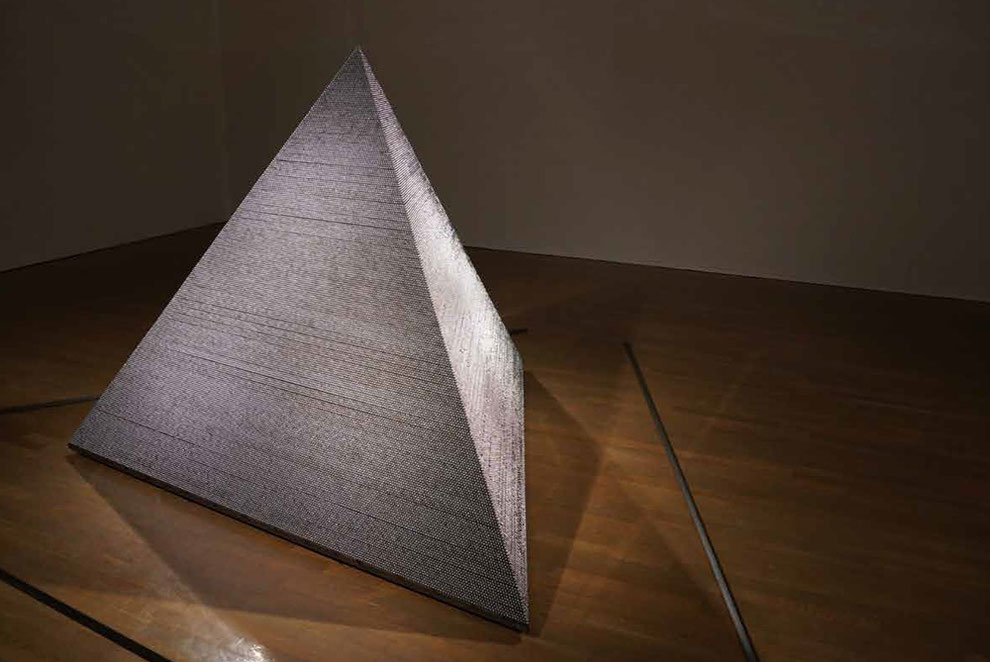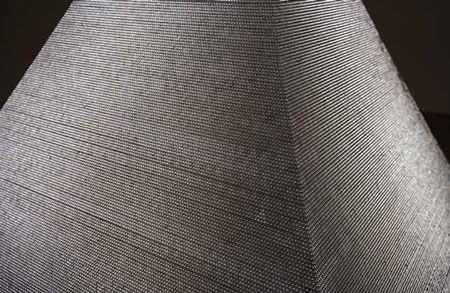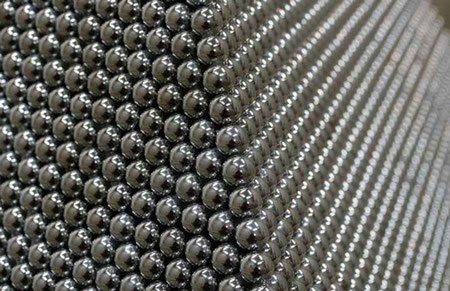- Home
- News
- Art Works
- PACHINKO TRIOGY ー777ー
- PYRMID ーYin Yang versionー
- FEVER
- MASS+GAME
- PYRAMID
- A VIVID MORNING ON THE NORTH SIDE
- MIKARA DETA SABI
- Paper model-type missile
- Plastic model-type missile
- LOVE IS STRONGER THAN DEATH
- LOVE&DEATH
- SCARY STORY
- MIKARA DETA SABI ーTERRITORYー
- MASS GAME —The Wasp—
- BLOOD
- MIMI-NASHI-HOICHI
- War Accessory
- DURST
- FLOWER POT —Destruction and Rebirth—
- Labor Mobilization
- DURST ZWEITE ーTERRITORYー
- DURST DRITTE —TOKYO WHITE CUBE—
- ANTI-GRAVITY
- Collaboration with Chinen Daichi
- Untitled
- Projects
- Biography
- Book
- Studio
PYRAMID

©Hayashi Yuki
2019
Pachinko balls (about 200,000 ), punching metal, iron pipe, adhesive
2 tons
W2600 D2600 H2600 mm
Exhibition
2019 PYRAMID
Nagi Museum of Contemporary Art, Okayama, Japan

©Hayashi Yuki

Statement
One idea that occurred to me in the process of creating one of the works exhibited here, was that pyramids are objects that nourish our fertile imagination, while at the same time indicating a certain thesis regarding the human society itself.
The structure I made is the result of an exquisite combination of two precisely made industrial products – pachinko balls and a perforated metal plate. The pachinko balls that I used also inspired the basic concept of working with “real” materials.
Pachinko parlors exist everywhere in Japan, in big cities as well as in rural areas, and it surely wouldn’t be exaggerated to say that pachinko has been an essential constituent of the post-war Japanese society. When doing some research on pachinko, a matter that we here in Japan should be well familiar with, I found out that there are quite a few other things involved, such as national, monetary and ethnic aspects, which made it even more fascinating. These findings were the main source of inspiration for the creation of this work.
I nonchalantly placed mass-produced pachinko balls on a perforated metal plate, and in the process of piling them on top of each other, I discovered the physical law that would naturally make the result a trigonal pyramidal structure. That discovery was one of the things that inspired me to build a pyramid as a metaphorical object onto which I could project the hierarchic structure that I instinctively lump together, based on the historical notions and implications of pachinko.
While making the pyramid, I realized that, although it is a small one, it shares the composition of structurally stable elements, and in addition, the symbolic character of pyramids in general. And these things eventually made me doubt whether pyramidal structures are really necessary in the contemporary social system that we are part of, and whether they will retain their strength and stability also in the future.
Fujiwara Yuki
(From a statement written for solo exhibition)
Translated by Andreas Stuhlmann
ステートメント
ピラミッドは我々に豊かな想像力を与えてくれると同時に、人間社会へのテーゼを指し示している、と今回の作品制作を通して思った。
この構造体は、パチンコ玉とパンチングメタル(穴が均等に空いた鉄板)という精度のある2つの工業製品の絶妙な組み合わせによって出来上がっている。今回の作品に使用しているパチンコ玉はリアルな素材でありコンセプトの一端を担っている。
パチンコ店は都会や地方を問わず国内各地にくまなく存在し、戦後以降、日本の社会を構成する要素の一つとなっているといっても過言ではない。そのような日本に住む我々にとって馴染みのあるパチンコの事を調べてみると国家や貨幣、民族など色々な要素が含まれていて、とても興味深かった。その事が今回の制作を始めるきっかけとなった。
量産型のパチンコ玉をパンチングメタルに無造作に並べ、積み重ねていくと自ずと三角錐のピラミッド型の構造体になるという法則を発見した事もあり、パチンコが含む歴史、意味合いから、私が感覚的に総称するヒエラルキー構造をピラミッドの構造体に託し、隠喩(メタファー)という形で表現しようと思った。
実際、制作してみて思った事は、ピラミッドは小さいながらも構造的に安定的な要素を持ち合わせている事。そして、象徴的である事。そのことを踏まえて疑念を持った。ピラミッド型の構造は我々が生きる現代社会のシステムに置いてやはり必然的であり安定的な強度を持ち続けるのか。
藤原勇輝
(個展用テキストより)
